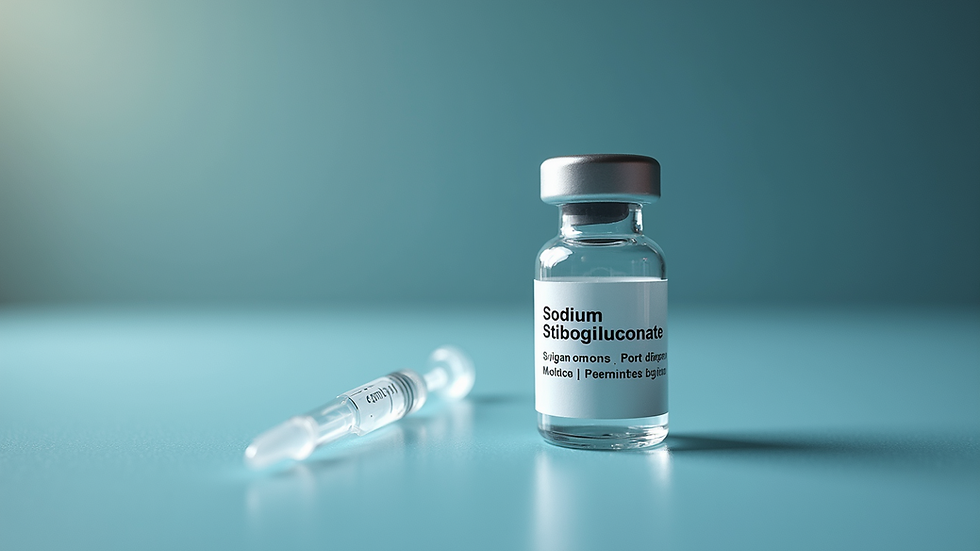Sodium Stibogluconate Injection for Treating Parasitic Diseases
- Farbe Firma Admin
- Jul 10, 2025
- 4 min read
Parasitic diseases can significantly impact health and well-being, causing various symptoms and complications. Treatment often requires specific medications, and one effective option is Sodium Stibogluconate Injection. This post delves into the benefits of this antiparasitic injection, how it works, and its applications in treating various parasitic infections.
Antiparasitic Injection Benefits
Sodium Stibogluconate is known for its effectiveness against certain parasitic diseases, particularly leishmaniasis. It belongs to a class of drugs that inhibit parasite growth and survival, making it a powerful tool in fighting infections. Understanding its benefits can help healthcare providers make informed decisions about treatment.
Firstly, Sodium Stibogluconate has a high success rate in treating leishmaniasis. Reports indicate cure rates ranging from 80% to 90% for cutaneous leishmaniasis, making it a preferred choice for healthcare professionals. In visceral leishmaniasis, the success rates are also promising, often exceeding 90%.
Secondly, the injection form of Sodium Stibogluconate allows for better absorption and faster action compared to oral medications. This is particularly important in cases where patients need immediate relief from symptoms.

Moreover, this drug has a relatively manageable side effect profile. Most patients tolerate Sodium Stibogluconate well, experiencing only mild symptoms such as nausea or muscle pain. These side effects are significantly less severe compared to some alternatives, enhancing patient compliance.
Additionally, the emergence of drug-resistant parasites is a rising concern in parasitic treatment. Sodium Stibogluconate Injection has shown resilience against resistance mechanisms, making it a reliable choice even as treatment challenges evolve.
What is Sodium Stibogluconate Used For?
Sodium Stibogluconate is primarily used for the treatment of leishmaniasis, a disease caused by parasites of the genus Leishmania. This disease can manifest in several forms: cutaneous (affecting the skin), mucocutaneous (affecting mucosal tissues), and visceral (affecting internal organs).
The cutaneous form results in skin sores, while the visceral form can lead to fever, weight loss, anemia, and potentially life-threatening complications. Mucocutaneous leishmaniasis can cause significant disfigurement.
Due to its effectiveness, Sodium Stibogluconate is especially favored in regions where leishmaniasis is endemic. The World Health Organization includes it in the list of essential medicines due to its critical role in treating this disease effectively.

Aside from leishmaniasis, Sodium Stibogluconate has been examined for use in other conditions, such as certain types of schistosomiasis. Schistosomiasis is another parasitic disease that affects millions worldwide. While Sodium Stibogluconate is not the first-line treatment specifically for schistosomiasis, its potential use adds to its versatility in treating various parasitic diseases.
The Mechanism of Action
Understanding how Sodium Stibogluconate works can enhance appreciation for its role in treatment. This drug exerts its action by inhibiting the enzyme pathways critical for the parasite's survival. By disrupting these pathways, it effectively stunts the growth of the parasites, leading to a reduction in their population.
The mechanism mainly involves the accumulation of toxic metabolites within the parasite cells. This toxicity ultimately leads to the death of the parasites, allowing the host’s immune system to recover and eliminate the remaining infected cells.
Interestingly, while the exact mechanisms are still under investigation, studies suggest that Sodium Stibogluconate may also enhance certain immune responses. This dual action of directly killing parasites while boosting host immunity highlights the versatility of this injection in combating complex infections.
Dosage and Administration
Administering Sodium Stibogluconate Injection requires careful consideration of the dosage and duration of treatment. The typical dosage varies based on the patient’s age, weight, and the severity of the infection.
For cutaneous leishmaniasis, the dosage is generally around 20 mg/kg daily for a period of 20 days. For visceral leishmaniasis, the treatment may last longer, often requiring 30 to 40 mg/kg in divided doses over the same time frame.
It is essential for healthcare professionals to monitor the patient’s response to the treatment throughout the therapy. Regular follow-ups can help adjust dosages if necessary and manage any side effects that may arise.

Safety and Side Effects
As with any medication, safety is paramount when using Sodium Stibogluconate Injection. While most patients tolerate the drug well, some might experience side effects, including:
Nausea
Vomiting
Muscle pain
Abdominal pain
Serious side effects are rare but can include liver toxicity, cardiovascular issues, and allergic reactions. Doctors should evaluate patients for any pre-existing conditions that may predispose them to these severe side effects.
In summary, Sodium Stibogluconate Injection is an effective and relatively safe option for treating parasitic diseases, particularly leishmaniasis. It is crucial to educate patients about potential side effects and the importance of adhering to prescribed treatment regimens.
Final Thoughts
Sodium Stibogluconate Injection plays a vital role in the fight against parasitic diseases, particularly leishmaniasis. Its benefits, including high success rates, rapid absorption, and a manageable side effect profile, make it a valuable medication for healthcare providers. As research continues, the potential applications of this injection may expand, providing hope for many battling parasitic infections.
Understanding the intricacies of this treatment can empower both healthcare professionals and patients to make informed decisions, ultimately improving health outcomes in the fight against parasitic diseases.




Comments